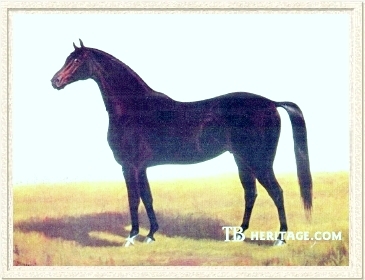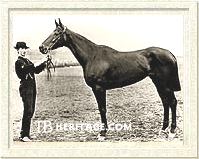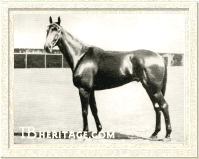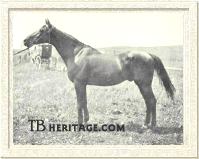|
|
Billet

|
|
 |
|
|
The male line of Blacklock had been a strong influence in breeding on both sides of the Atlantic. He had sired Brutandorf, Velocipede, Laurel, Voltaire, and *Buzzard. The latter, along with *Tranby, and *Belshazzar had been imported to America and proven successful sires. *Belshazzar's sister Panthea, was the dam of another important imported sire in *Albion.
The blood of Blacklock's son Voltaire, however, was not as popular in the States, despite his siring Charles XII, Barnton, and Voltigeur. Voltigeur's line continued with Skirmisher and Vedette from his 1854 crop, but was old news by the mid 1860s. Vedette sired Speculum (1865) and Galopin (1872) but otherwise, Voltigeur's line was dwindling in importance until a strip was transplanted by chance and took root in America in the form of *Billet.
Bred in England by Mr. James Smith, *Billet was a full brother to the good runner Bivouac, but was himself a selling plater at best. He won five races at two from 17 starts, including the Zetland Stakes (five furlongs, forty-four yards at York), Egham Stakes (six furlongs at York) and Marcham Park Stakes (six furlongs at Abingdon), a sweepstakes (half mile, Newmarket First October Meeting), and a selling sweepstakes (five furlongs, Worcester). He also placed second in the Elsmere Stakes (Durham), Eglinton Stakes, third in the Enville Plate. The Enville was his final start in which his extended campaign finally took its toll; he pulled up lame at the finish, and was sold. At three, *Billet attempted a comeback but was unplaced in his only outing. He retired from the turf with five wins from 18 starts.
Billet in the Stud
Sold to American A.H Thompson, *Billet was shipped to New York later in 1868, and resold to Samuel Powers who had a prominent stud farm near Decatur, Illinois. Here, *Billet entered stud as a four-year-old in 1869. He was marketed well, and was shown successfully with his get at county fairs. Eventually, he won a class at the Great St. Louis Fair, with several of his offspring as yearlings and sucklings also winning premiums.
Runners from *Billet's early crops caught the interest of Col. Ezekiel Clay and Catesby Woodford, owners of Runnymede Stud near Paris in Bourbon County, Kentucky, and their financial partner George W. Bowen. One of these was the overgrown filly KATE CLAXTON (1875), whose entry in a two-year-old race at Louisville was contested due to her great size and maturity. A check of her teeth proved her eligibility, but all the brouhaha had pushed Kate Claxton over the top temperamentally. She ran off with her inexperienced rider and lost the race, but her precociousness and style encouraged Col. Clay to investigate her background. He purchased her sire for $5,000, and *Billet stood his first Kentucky season in 1878 at Clay's Runnymede Stud. Clay's instincts proved dead on, because later that year, the two-year-old VOLTURNO (1876) burst onto the scene, and his full brother ELIAS LAWRENCE (1877) came on two years later.
Both of these were out of Samuel Powers' top broodmare Sprightly (by Lexington out of Lightsome, an unraced full sister to two other outstanding mares in Nevada (dam of Luke Blackburn), and Salina (dam of Salvator). VOLTURNO (b.c. 1876) was bred by Samuel Powers at won four of five races at two including the Planters' House Stakes (six furlongs, St. Louis) in his racing debut, the Revere House Stakes (one mile, Boston), a race at Saratoga (five furlongs) and a handicap open to all ages (five furlongs, Saratoga). He was also third in the Lucas and Hunt Stakes. At three, Volturno won six of ten starts and although he got a late start on the season. Victories included the United States Hotel Stakes (twelve furlongs, Saratoga) defeating Harold, Atlantic Handicap (same distance, at Monmouth), Sequel Handicap, and Breckenridge Stakes (two miles Baltimore) defeating Harold in a brilliant season finale. At four Volturno won four of six races including the Louisville Cup (two and a half miles) on a muddy track. He went lame in his left front and was retired to stud at Powers' farm in Illinois, although he got nothing of note as a sire.
ELIAS LAWRENCE (dk.b.c. 1877 out of Sprightly by Lexington) was a year younger brother to Volturno, also bred by Samuel Powers in Illinois. At two, his best effort was a third in the Ocean Stakes to Luke Blackburn and Quito from two starts. At three, he won six of 18 starts and placed second or third in nine others. His wins included, People's Line Stakes (two miles Saratoga), Baden Baden Handicap (three miles) setting a new world record of 5:28 _ for a three-year-old at that distance. His top placings included seconds in the Long Island St. Leger (to Luke Blackburn), Sequel Stakes (to Ferncliff), and Jerome Park Cup (to Monitor). At four, Elias Lawrence won just once in nine starts, but was also second in the Baltimore Cup (to Monitor), and Great Long Island Stakes (to Glenmore), although he suffered a career ending injury in the second heat of the latter. Like his brother, Volturno, Elias Lawrence retired to stud in Illinois but left no important legacy there.
*Billet's first Kentucky crop, foals of 1879, delivered the stakes winners Runnymede and Belle of Runnymede. RUNNYMEDE (br.c. 1879 out of Mercedes by Melbourne Jr.) was bred at his namesake farm by the partners Clay and Woodford, and was raced by the Dwyer Brothers, for whom he captured the prestigious Clark Handicap, Lorillard Stakes, and Tidal Handicap, and was second in the Kentucky Derby to Apollo. He was generally considered the best of his age that year, although he did nothing to further his reputation as a sire.
BELLE OF RUNNYMEDE (b.f. 1879 out of Fancy Jane by Neil Robinson) was also bred at Runnymede and, for the stable of Bowen & Company, won the Alabama Stakes, the most important filly stakes at Saratoga, and at the time, the rough equivalent of the English Oaks. Belle of Runnymede returned to her birthplace and bred to the home sire Hindoo, produced the important broodmare Miss Clay (1885) granddam of several top runners including champion juvenile Mesmerist, Belmont Stakes winner Scottish Chieftain, and stakes winning broodmares Hatasoo and Misgivings.
The 1880 crop included Runnymede's brother Barnes, and Belle of Runnymede's sister Miss Woodford. BARNES (b.c. 1880 out of Mercedes by Melbourne Jr.) also raced for the Dwyer Brothers and was one of the best of his age at three with wins in the Travers Stakes, Tidal Stakes, and Brooklyn Derby, a race that would later be renamed the Dwyer Stakes in honor of Barnes' owners. At stud, he got two useful daughters in Miss Barnes and Van-A-Clar (dam of Kentucky Oaks winner and broodmare Wing Ting), both from his 1888 foal crop.
MISS WOODFORD (br.f. 1880 out of Fancy Jane by Neil Robinson) turned out to be one of the best American fillies of all time. Bred at Runnymede (although she is sometimes listed as "bred by George W. Bowen & Co."), she initially raced for Bowen & Company, winning the Spinaway Stakes. At three, her ownership transferred to the Dwyer Brothers as part of a transaction in which she and $9,000 cash was exchanged for a package of retiring runners. These were headed up by the Dwyers' champion colt Hindoo, bought as a stallion prospect, and two daughters of the great mare Maggie B.B., Red and Blue (by Alarm) and Francesca (by Leamington), the latter a stakes winner. (Later in 1883, George Bowen sold his interest in the Runnymede Stud for $15,000 to partners Clay and Woodford, who continued the operation with great success.)
|

Miss Woodford
| |
Miss Woodford again dominated her division at three, winning 10 of 12 starts including the Alabama Stakes, Monmouth Oaks, and Ladies Handicap against her own sex, and the Pimlico Stakes, beating the colt champion George Kinney. At four, she was undefeated in nine starts, and had become a national hero, a mare for the mobs, declared by her supporters to be the greatest runner ever bred. Her wins included the Coney Island Stakes (Sheepshead Bay, beating Kinglike), Ocean Stakes (Monmouth) which she won "in a canter" from stablemate George Kinney and serious rival Aranza, and Long Island Stakes.
|
Miss Woodford returned at five and managed to continue her undefeated skein to 16 races, but in the end was beaten more than once by horses peaking on their own merits. In a dozen starts that season, she won seven, including the Eclipse Stakes (beating Modesty and Volante), Monmouth Cup (beating Drake Carter), Freehold Stakes (again beating Drake Carter), Great Long Island Stakes (won in two mile heats, beating Binette), and a match race with Ed Corrigan's six-year-old gelding Freeland. She was matched against Freeland twice more and the gelding beat her two out of three, tarnishing her public image somewhat. She retired at the end of that season with a lifetime total of 37 wins in 48 starts and her earnings of $118,270, were a new earnings record for either sex in America, although she only held that honor briefly.
The Dwyers were not interested in breeding and sold their prize filly to James B.A. Haggin. Although she was not very effective as a broodmare, Miss Woodford produced the stakes winners George Kessler and Sombre and three other winners from nine foals. She died in 1899 at Elmendorf Farm in Kentucky.
Miss Woodford's exploits at three took *Billet to the top of the Leading Sire list in 1883.
His 1883 crop included two of the best three-year-old fillies in the land, MILLIE (b.f. out of Distraction by War Dance), winner of the Alabama Stakes; and PURE RYE (b.f. 1883 out of Mary Clark by Lexington), winner of the Kentucky Oaks.
|

Raceland

Sir Dixon
| |
Foals conceived the next season included two more of his very best, Raceland and Sir Dixon. RACELAND (g. 1885 out of Calomel by Canwell), named for Col. Woodford's farm, near Paris, Kentucky, was the champion of his crop at two, and the champion handicap male at four, when he won the prestigious Suburban Handicap. In all, he won 70 races and his earnings of $116,391 placed him as the greatest money-winning gelding in America up to that point.
*Billet's best racing son, SIR DIXON (br.c. 1885 out of Jaconet by *Leamington), was sold as a yearling by Runnymede Stud to Green B. Morris, who resold him to the Dwyer Brothers for $20,000. He was the champion of his crop at two and three, winning the Withers Stakes, Belmont Stakes, Travers Stakes, Carlton Stakes, and Lorillard Stakes. Clay and Woodford bought him back to stand at stud at Runnymede, where he became the Leading Sire of 1901. Sir Dixon's best runners included the champion fillies The Butterflies (1892), Blue Girl (1899), and Running Water (1903); champion colt Kilmarnock (1897), Kentucky Derby winner Agile (1902), Travers winner Blues (1898), and Kentucky Oaks winner Audience (later dam of the important runner and sire Whisk Broom II).
|
After Sir Dixon, *Billet's next best sire son was Sir Dixon's year older full brother BELVIDERE (b.c. 1884 out of Jaconet by *Leamington). A high class runner in his own right, he sired the champion two-year-old Salvidere (1904), Preakness/Belmont Stakes winner Belmar (1892), and several other good ones.
Other major winners by *Billet included MISS HAWKINS (b.f. 1888 out of Lady Motley by Lexington), winner of the Kentucky Oaks in 1891; MISS PALMER (br.f. 1882 out of Belle Palmer by *Bonnie Scotland), winner of the Ladies Handicap at three; BLUE WING (b.c. 1883 out of Mundane by Lexington), winner of the Clark Handicap; NEWTON (b.c. 1889 out of Vassar by Virgil), winner of the Latonia Derby and Sheridan Stakes; BALLSTON (br.c. 1885 out of Villette by Virgil), winner of the U.S. Hotel Stakes; GREY DAWN (gr.c. 1885 out of Mary Clark by Lexington), winner of the Brookdale Handicap; CARROLL (b.c. 1886 out of Juanita by Wanderer), winner of the Carlton Stakes); BURTON (b.c. 1881 out of Distraction by War Dance), winner of the Flash Stakes; and EVA S. (b.f. 1881 out of Mamie S. by Mahomet), winner of the Clipsetta Stakes.
Besides getting the good sires Sir Dixon, Belvidere, and Barnes, *Billet's daughters left a strong imprint. Besides Belle of Runnymede and Miss Woodford, his most important producing daughters included Patti (dam of Kentucky Derby winner Montrose and his stakes winner full siblings Retrieve, Monterey, and Promenade, all by Duke of Montrose), The Lioness (dam of stakes winners Lion Heart, Mainspring, and Standing), Latonia (dam of Lew Wier), Mattie T.
Like many of the Voltigeur line (which includes the more prominent European strip through Vedette-Galopin-St. Simon), *Billet was a dark brown horse with few white markings, just a small star and his left front coronet white. All of *Billet's important offspring named above were bay or brown with the exception of the grey colt Grey Dawn. This suggests that *Billet, like St. Simon, was pure dominant for bays and browns, and could not sire a chestnut.
*Billet stood at Runnymede initially as the property of Mssrs. George W. Bowen and Company (also the official breeder of the early Runnymede horses), meaning his co-partners Col. Woodford and Col. Clay, whose family owned the studs where the horses were raised. After Bowen sold out in 1833, the horse and the rest of the stud was owned by Clay and Woodford, who backed off from racing their stock to selling the offspring of *Billet at great profit. *Billet lived at Runnymede until his death on January 17, 1889 at the age of 24. He was buried there in a grave that is now unmarked.
--Anne Peters
|
|
|
|

